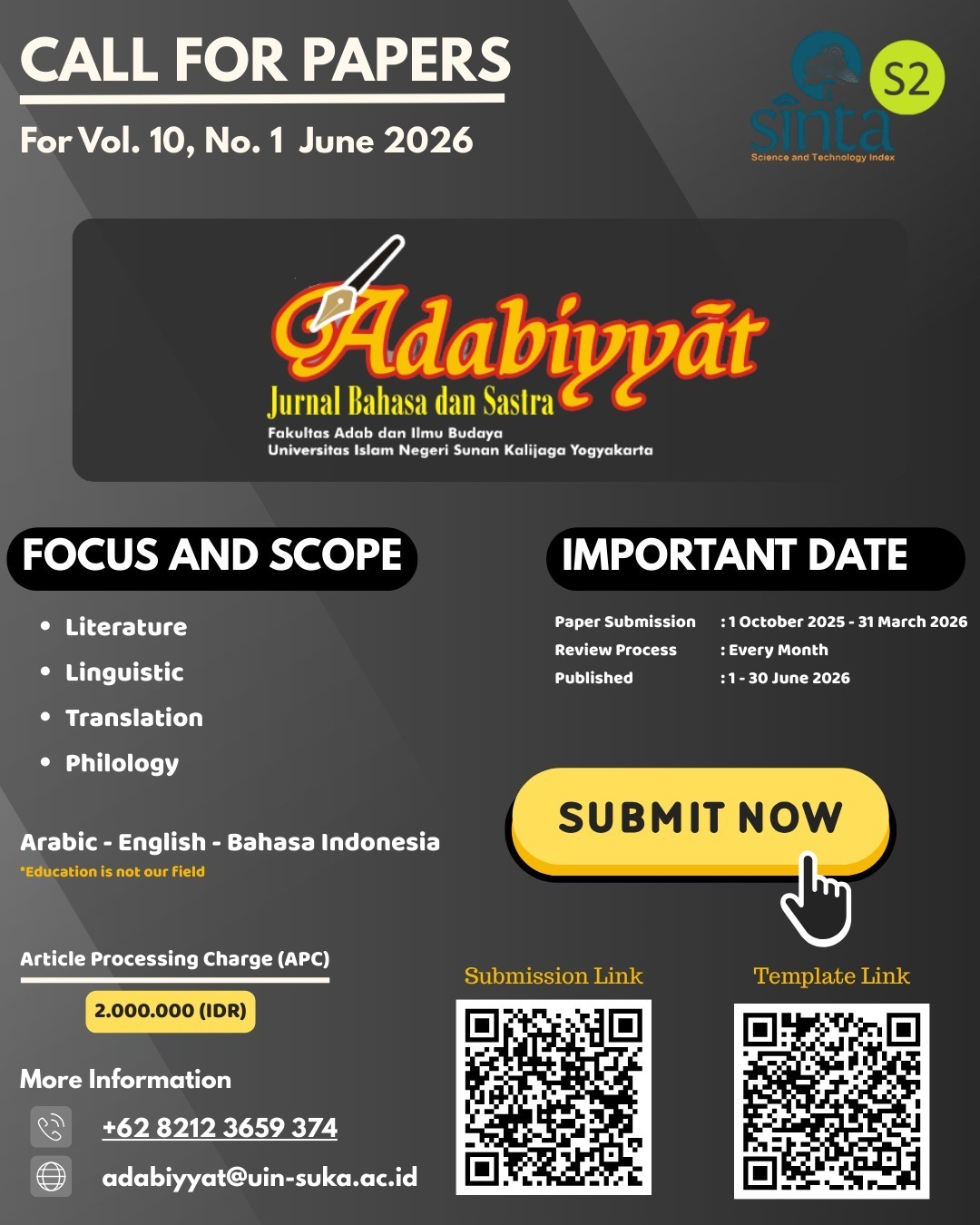KEHIDUPAN MEMBIARA DAN JEBAKAN TAKDIR: SUBJEKTIVITAS ROMO YB MANGUNWIJAYA DALAM PERSPEKTIF SLAVOJ ŽIŽEK
DOI:
https://doi.org/10.14421/ajbs.2023.07011Keywords:
fractures and disorientation, symbolic entanglements, primordial alienation, discursive analysisAbstract
The monastic life for celibate individuals is not a problem-free life choice. As human beings, individuals who choose the monastic life face various biological, sociological, and psychological upheavals that are not easily overcome. These upheavals can lead to a crisis of faith. This study aims to uncover the issues faced by celibate individuals as depicted in the novel "Romo Rahardi" by YB Mangunwijaya. The study will employ Slavoj Žižek's symbolic discursive theory to unravel the symbolic entanglements that constrain the subjects and reveal the characters' positions in confronting their lives as celibate individuals. This research is a qualitative descriptive study that utilizes a discursive approach. The findings of this research reveal fractures and disorientation in the subjective realm. When Rahadi reaches the age of puberty, he becomes aware of the extraordinary sexual attraction towards the opposite sex, and he views this phenomenon as something good, natural, and positive. However, this awareness becomes a tremendous black hole as Rahadi enters the symbolic order. The celibate lifestyle confines him without the opportunity to explore alternative paths. In the real realm, when Rahadi reflects on the reality of his life as a spiritual person, he discovers a fragmented and incomplete subjective condition that is far from ideal—a primordial and absurd alienation. There exists a homology between Romo Rahadi and Romo YB Mangunwijaya.
Downloads
References
Adian, Donny Gahral. 2011. Setelah Marxisme: Sejumlah Teori Ideologi Kontemporer. Depok: Koekoesan.
Akmal, Ramayda. 2018. Melawan Takdir: Subjektivitas Pramoedya Ananta Toer dalam Perspektif Psikoanalisis-Historis Stavoi Zizek. Yogyakarta: Octopus Publishing.
Haryatmoko. 2016. Critical Discourse Analysis: (Analisis Wacana Kritis), Landasan Teori, Metodologi dan Penerapan. Jakarta: PT. RajaGrafindo Persada.
Katolik, Vatolik. 2019. “Hidup Selibat di dalam Kitab Suci.” Gereja Katolik (blog). 2 September 2019. https://vatikankatolik.id/selibat/.
Kristiatmo, Thomas. 2007. Redefinisi Subjek dalam Kebudayaan: Pengantar Memahami Subjektivitas Modern Menurut Perspektif Slavoj Zizek. Yogyakarta: Jalasutra.
Kusumawanta, D. Gusti Bagus. 2023. “Selibat, Bentuk Solidaritas Orang Yang Terpinggirkan.” Katolisitas.Org (blog). 6 Juni 2023.
https://www.katolisitas.org/selibat-bentuk-solidaritas-orang-yang-terpinggirkan/.
Mangunwijaya, Y. B. 2018. Romo Rahadi. 5 ed. Yogyakarta: Kanisius.
Rahmanto, B. 2001. Y.B. Mangunwijaya: Karya dan Dunianya. Jakarta: Grasindo.
Robert, Robertus. 2010. Manusia Politik: Subjek Radikal dan Politik Emansipasi di Era Kapitalisme Global Menurut Slavoj Žižek Tangerang: Marjin Kiri.
Suryajaya, Martin. 2014. “Slavoj Zijek dan Pembentukan Identitas Subjektif Melalui Bahasa.” Jurnal Ultima Humaniora 2 (2): 136–47.
Taum, Yoseph Yapi. 1997. Teori Sastra. Ende: Nusa Indah.
———. 2015. Sastra dan Politik: Representasi Tragedi 1965 dalam Negara Orde Baru. Cetakan Pertama. Mrican, Yogyakarta: Sanata Dharma University Press.
———. 2017. “Kritik Sastra Diskursif: Sebuah Reposisi.” Dipresentasikan pada Seminar Nasional Kritik Sastra ’Kritik Sastra yang Memotivasi dan Menginspirasi, Jakarta: Badan Pengembangan dan Pembinaan Bahasa Kemendikbud.
Žižek, Slavoj. 1989. The Sublime Object of Ideology. The Essential Žižek. London New York: Verso.
Downloads
Published
Issue
Section
License
- Adabiyyāt: Jurnal Bahasa dan Sastra publishes all articles entirely in full text.
- It is permissible for readers to download and to use it for scientific purposes and scientific dissemination.
- The author can re-publish the article that has been published by the Adabiyyāt: Jurnal Bahasa dan Sastra after obtaining written permission from the editor. This letter can be obtained by submitting a request letter for permission to republish the article to Adabiyyāt: Jurnal Bahasa dan Sastra via email adabiyyat@uin-suka.ac.id. In the second publication, the author is required to include information that the article was firstly published by the Adabiyyāt: Jurnal Bahasa dan Sastra.









